Types of Exams
Anita Frederiks; Kate Derrington; and Cristy Bartlett
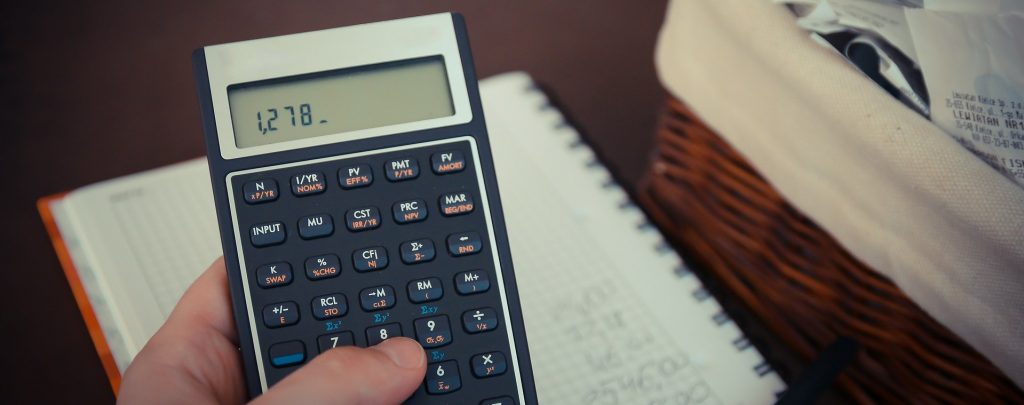
Introduction
There are many different types of exams and exam questions that you may need to prepare for at university. Each type of exam has different considerations and preparation, in addition to knowing the course material. This chapter extends the discussion from the previous chapter and examines different types of exams, including multiple choice, essay, and maths exams, and some strategies specific for those exam types. The aim of this chapter is to provide you with an overview of the different types of exams and the specific strategies for preparing and undertaking them.
The COVID19 pandemic has led to a number of activities previously undertaken on campus becoming online activities. This includes exams, so we have provided advice for both on campus (or in person) exams as well as alternative and online exams. We recommend that you read the chapter Preparing for Exams before reading this chapter about the specific types of exams that you will be undertaking.
Types of exams
During your university studies you may have exams that require you to attend in person, either on campus or at a study centre, or you may have online exams. Regardless of whether you take the exam in person or online, your exams may have different requirements and it is important that you know what those requirements are. We have provided an overview of closed, restricted, and open exams below, but always check the specific requirements for your exams.
Closed exams
These exams allow you to bring only your writing and drawing instruments. Formula sheets (in the case of maths and statistics exams) may or may not be provided.
Restricted exams
These exams allow you to bring in only specific things such as a single page of notes, or in the case of maths exams, a calculator or a formula sheet. You may be required to hand in your notes or formula sheet with your exam paper.
Open book exams
These exams allow you to have access to any printed or written material and a calculator (if required) during the exam. If you are completing your exam online, you may also be able to access online resources. The emphasis in open book exams is on conceptual understanding and application of knowledge rather than just the ability to recall facts.
Myth: You may think open book exams will be easier than closed exams because you can have all your study materials with you.
Reality: Open book exams require preparation, a good understanding of your content and an effective system of organising your notes so you can find the relevant information quickly during your exam. Open book exams generally require more detailed responses. You are required to demonstrate your knowledge and understanding of a subject as well as your ability to find and apply information applicable to the topic. Questions in open book exams often require complex answers and you are expected to use reason and evidence to support your responses. The more organised you are, the more time you have to focus on answering your questions and less time on searching for information in your notes and books. Consider these tips in the table below when preparing for an open book exam.
Tips for preparing your materials for open or unrestricted exams
- Organise your notes logically with headings and page numbers
- Use different colours to highlight and separate different topics
- Be familiar with the layout of any books you will be using during the exam. Use sticky notes to mark important information for quick reference during the exam.
- Use your learning objectives from each week or for each new module of content, to help determine what is important (and likely to be on the exam).
- Create an alphabetical index for all the important topics likely to be on the exam. Include the page numbers, in your notes or textbooks, of where to find the relevant information on these topics.
- If you have a large quantity of other documents, for example if you are a law student, consider binding legislation and cases or place them in a folder. Use sticky notes to indicate the most relevant sections.
- Write a summary page which includes, where relevant, important definitions, formulas, rules, graphs and diagrams with examples if required.
- Know how to use your calculator efficiently and effectively (if required).
Take home exams
These are a special type of open book exam where you are provided with the exam paper and are able to complete it away from an exam centre over a set period of time. You are able to use whatever books, journals, websites you have available and as a result, take-home exams usually require more exploration and in-depth responses than other types of exams.
It is just as important to be organised with take home exams. Although there is usually a longer period available for completing these types of exams, the risk is that you can spend too long researching and not enough time planning and writing your exam. It is also important to allow enough time for submitting your completed exam.
Tips for completing take home exams
- Arrange for a quiet and organised space to do the exam
- Tell your family or house mates that you will be doing a take-home exam and that you would appreciate their cooperation
- Make sure you know the correct date of submission for the exam paper
- Know the exam format, question types and content that will be covered
- As with open book exams, read your textbook and work through any chapter questions
- Do preliminary research and bookmark useful websites or download relevant journal articles
- Take notes and/or mark sections of your textbook with sticky notes
- Organise and classify your notes in a logical order so once you know the exam topic you will be able to find what you need to answer it easily
When answering open book and take-home exams remember these three steps below.
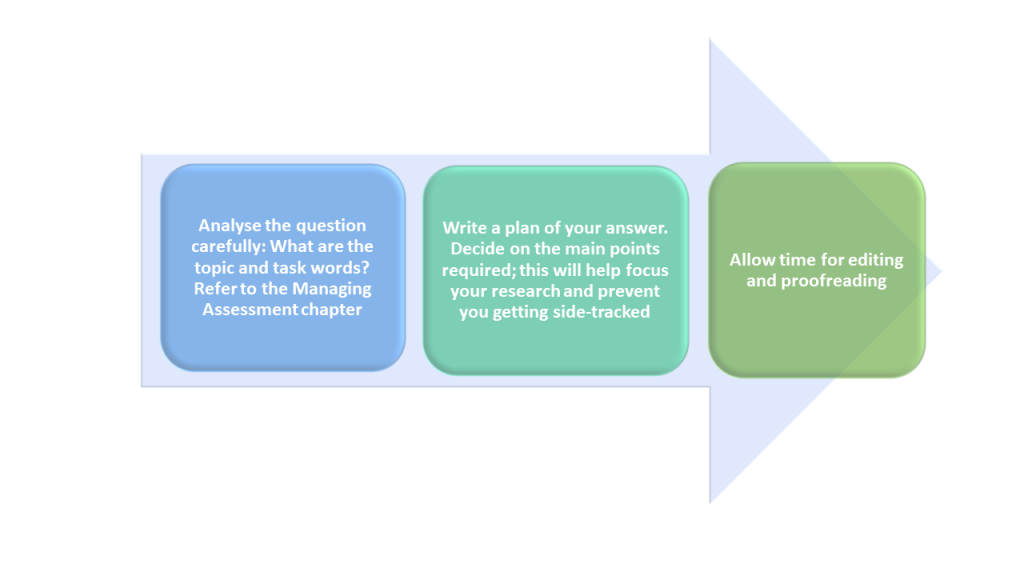
Multiple choice
Multiple choice questions are often used in online assignments, quizzes, and exams. It is tempting to think that these types of questions are easier than short answer or essay questions because the answer is right in front of you. However, like other types of assessment, multiple choice questions require you to understand and apply the content from your study materials or lectures. This requires preparation and thorough content knowledge to be able to retrieve the correct answer quickly. The following sections discuss strategies on effectively preparing for, and answering, multiple choice questions, the typical format of multiple choice questions, and some common myths about these types of questions.
Preparing for multiple choice questions
- Prepare as you do for other types of exams (see the Preparing for Exams chapter for study strategies).
- Find past or practice exam papers (where available), and practise doing multiple choice questions.
- Create your own multiple choice questions to assess the content, this prompts you to think about the material more deeply and is a good way to practise answering multiple choice questions.
- If there are quizzes in your course, complete these (you may be able to have multiple attempts to help build your skills).
- Calculate the time allowed for answering the multiple-choice section of the exam. Ideally do this before you get to the exam if you know the details.
Strategies for use during the exam
- Consider the time allocated per question to guide how you use your time in the exam. Don’t spend all of your time on one question, leaving the rest unanswered. Figure 18.3 provides some strategies for managing questions during the exam.
- Carefully mark your response to the questions and ensure that your answer matches the question number on the answer sheet.
- Review your answers if you have time once you have answered all questions on the exam.
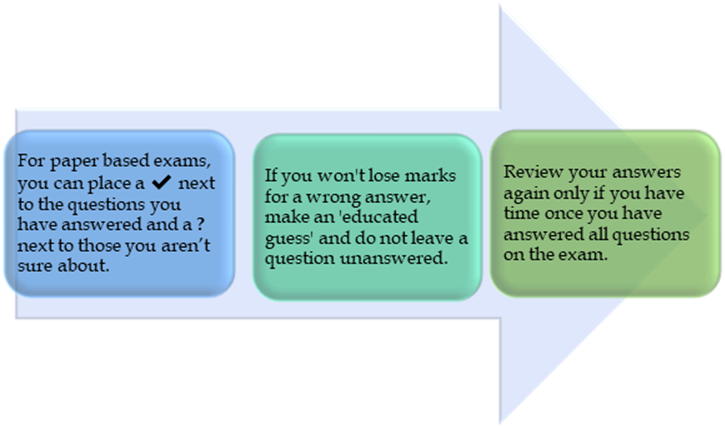
Format of multiple choice questions
The most frequently used format of a multiple choice question has two components, the question (may include additional detail or statement) and possible answers.
[table id=23 /]
The example below is of a simple form of multiple choice question.
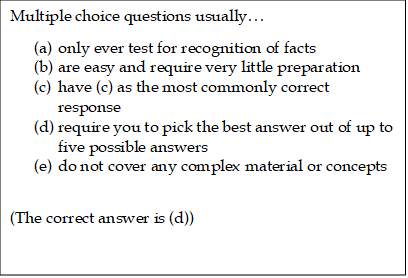
Multiple choice myths
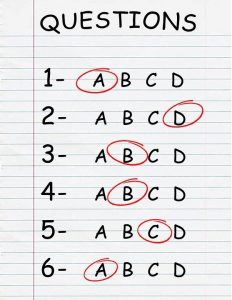
These are some of the common myths about multiple choice questions that are NOT accurate:
- You don’t need to study for multiple choice tests
- Multiple choice questions are easy to get right
- Getting these questions correct is just good luck
- Multiple choice questions take very little time to read and answer
- Multiple choice questions cannot cover complex concepts or ideas
- C is most likely correct
- Answers will always follow a pattern, e.g., badcbadcbadc
- You get more questions correct if you alternate your answers
None of the answers above are correct! Multiple choice questions may appear short with the answer provided, but this does not mean that you will be able to complete them quickly. Some questions require thought and further calculations before you can determine the answer.
Short answer exams
Short answer, or extended response exams focus on knowledge and understanding of terms and concepts along with the relationships between them. Depending on your study area, short answer responses could require you to write a sentence or a short paragraph or to solve a mathematical problem. Check the expectations with your lecturer or tutor prior to your exam. Try the preparation strategies suggested in the section below.
Preparation strategies for short answer responses
- Concentrate on key terms and concepts
- It is not advised to prepare and learn specific answers as you may not get that exact question on exam day; instead know how to apply your content.
- Learn similarities and differences between similar terms and concepts, e.g. stalagmite and stalactite.
- Learn some relevant examples or supporting evidence you can apply to demonstrate your application and understanding.
There are also some common mistakes to avoid when completing your short answer exam as seen below.
Common mistakes in short answer responses
- Misinterpreting the question
- Not answering the question sufficiently
- Not providing an example
- Response not structured or focused
- Wasting time on questions worth fewer marks
- Leaving questions unanswered
- Not showing working (if calculations were required)
Use these three tips in Figure 21.6 when completing your short answer responses.
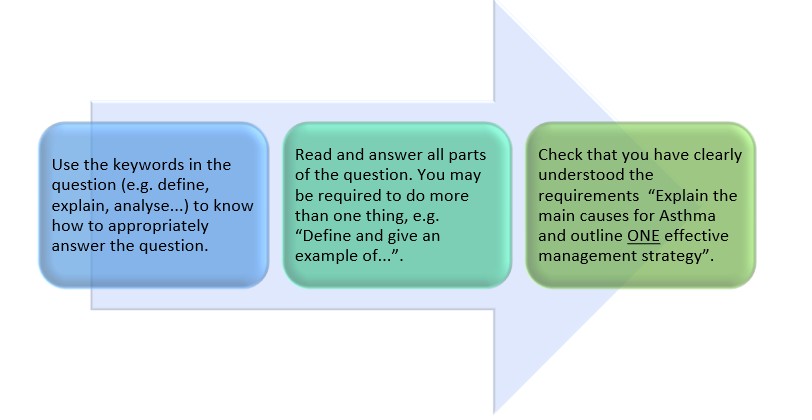
Essay exams
As with other types of exams, you should adjust your preparation to suit the style of questions you will be asked. Essay exam questions require a response with multiple paragraphs and should be logical and well-structured.
It is preferable not to prepare and learn an essay in anticipation of the question you may get on the exam. Instead, it is better to learn the information that you would need to include in an essay and be able to apply this to the specific question on exam day. Although you may have an idea of the content that will be examined, usually you will not know the exact question. If your exam is handwritten, ensure that your writing is legible. You won’t get any marks if your writing cannot be read by your marker. You may wish to practise your handwriting, so you are less fatigued in the exam.
Follow these three tips in Figure 21.7 below for completing an essay exam.
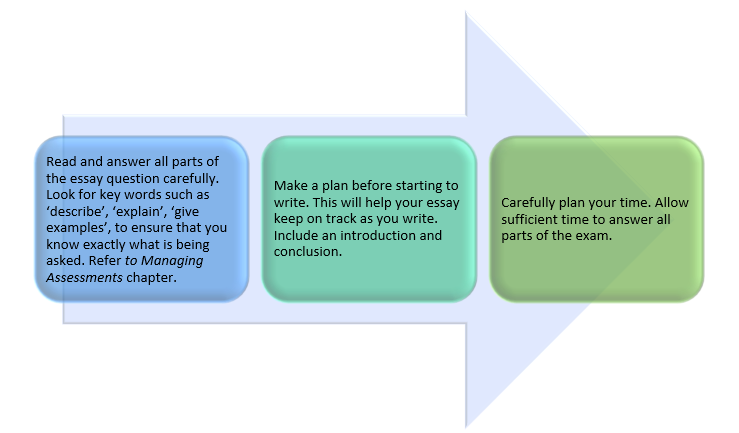
Case study exams
Case study questions in exams are often quite complex and include multiple details. This is deliberate to allow you to demonstrate your problem solving and critical thinking abilities. Case study exams require you to apply your knowledge to a real-life situation. The exam question may include information in various formats including a scenario, client brief, case history, patient information, a graph, or table. You may be required to answer a series of questions or interpret or conduct an analysis. Follow the tips below in Figure 21.8 for completing a case study response.
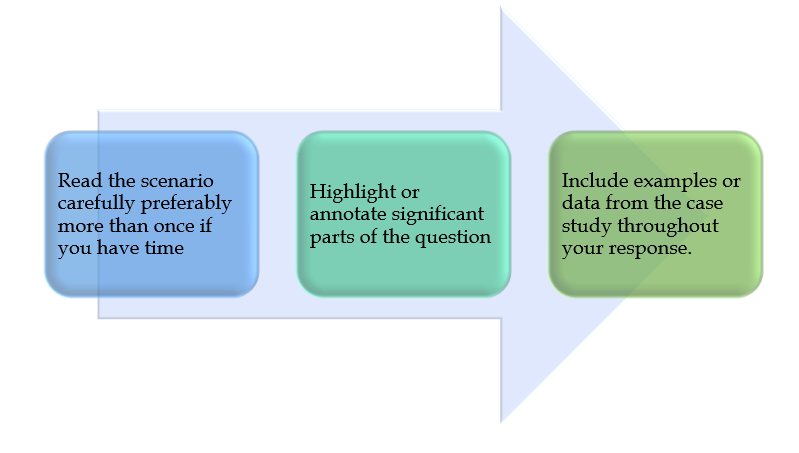
Maths exams
This section covers strategies for preparing and completing, maths-based exams. When preparing for a maths exam, an important consideration is the type of exam you will be sitting and what you can, and cannot, bring in with you (for in person exams). Maths exams may be open, restricted or closed. More information about each of these is included in Table 21.2 below. The information about the type of exam for your course can be found in the examination information provided by your university.
[table id=24 /]
Once you have considered the type of exam you will be taking and know what materials you will be able to use, you need to focus on preparing for the exam. Preparation for your maths exams should be happening throughout the semester.
Maths exam preparation tips
- Review the information about spaced practice in the previous chapter Preparing for Exams to maximise your exam preparation
- It is best NOT to start studying the night before the exam. Cramming doesn’t work as well as spending regular time studying throughout the course. See additional information on cramming in the previous chapter Preparing for Exams).
- Review your notes and make a concise list of important concepts and formulae
- Make sure you know these formulae and more importantly, how to use them
- Work through your tutorial problems again (without looking at the solutions). Do not just read over them. Working through problems will help you to remember how to do them.
- Work through any practice or past exams which have been provided to you. You can also make your own practice exam by finding problems from your course materials. See the Practice Testing section in the previous Preparing for Exams chapter for more information.
- When working through practice exams, give yourself a time limit. Don’t use your notes or books, treat it like the real exam.
- Finally, it is essential to get a good night’s sleep before the exam so you are well rested and can concentrate when you take the exam.
Multiple choice questions in maths exams
Multiple choice questions in maths exams normally test your knowledge of concepts and may require you to complete calculations. For more information about answering multiple choice questions, please see the multiple choice exam section in this chapter.
Short answer questions in maths exams
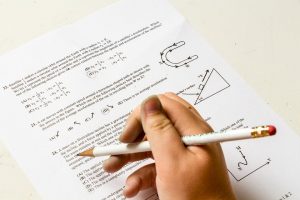
These type of questions in a maths exam require you to write a short answer response to the question and provide any mathematical working. Things to remember for these question types include:
- Read each question carefully (a couple times). Consider:
- what the question is asking you to do?
- what information are you given?
- is there anything else you need to do (multi-step questions) to get the answer?
- Highlight/underline the key words. If possible, draw a picture—this helps to visualise the problem (and there may be marks associated with diagrams).
- Show all working! Markers cannot give you makes if they cannot follow your working.
- Check your work.
- Ensure that your work is clear and able to be read.
Exam day tips
Before you start your maths exam, you should take some time to peruse (read through) the exam. Regardless of whether your exam has a dedicated perusal time, we recommend that you spend time at the beginning of the exam to read through the whole exam. Below are some strategies for perusing and completing maths based exams.
When you commence your exam:
- Read the exam instructions carefully, if you have any queries, clarify with your exam supervisor
- During the perusal time, write down anything you are worried about forgetting during the exam
- Read each question carefully, look for key words, make notes and write formulae
- Prioritise questions. Do the questions you are most comfortable with first and spend more time on the questions worth more marks. This will help you to maximise your marks.
Once you have read through your options and made a plan on how to best approach your exam, it is time to focus on completing your maths exam. During your exam:
- Label each question clearly—this will allow the marker to find each question (and part), as normally you can answer questions in any order you want! (If you are required to answer the questions in a particular order it will be included as part of your exam instructions.)
- If you get stuck, write down anything you know about that type of question – it could earn you marks
- The process is important—show that you understand the process by writing your working or the process, even if the numbers don’t work out
- If you get really stuck on a question, don’t spend too long on it. Complete the other questions, something might come to you when you are working on a different question.
- Where possible, draw pictures even if you can’t find the words to explain
- Avoid using whiteout to correct mistakes, use a single line to cross out incorrect working
- Don’t forget to use the correct units of measurement
- If time permits, check your working and review your work once you have answered all the questions
Conclusion
This chapter provided an overview of different types of exams and some specific preparation strategies. Practising for the specific type of exam you will be completing has a number of benefits, including helping you to become comfortable (or at least familiar) with the type of exam and allowing you to focus on answering the questions themselves. It also allows you to adapt your exam preparation to best prepare you for the exam.
Key points
- Know your exam type and practise answering those types of questions.
- Ensure you know the requirements for your specific type of exam (e.g., closed, restricted, open book) and what materials you can use in the exam.
- Multiple choice exams – read the response options carefully.
- Short answer exams– double check that you have answered all parts of the question.
- Essay exams – practise writing essay responses under timed exam conditions.
- Case study exams – ensure that you refer to the case in your response.
- Maths exams – include your working for maths and statistics exams
- For handwritten exams write legibly, so your maker can read your work.

